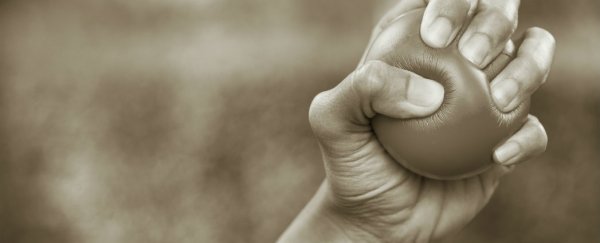We all know that a strong handshake can help you in a job interview, but it turns out it's not just potential employers who will judge you on your handshake - doctors might soon do so too.
An international study involving 140,000 adults from 17 different countries has associated a weak grip with an increased risk of heart attack and stroke, and a shorter survival time when diagnosed with a serious disease.
The study also found that grip strength is an even better predictor of death than blood pressure, leading the team to suggest that it could be a good screening tool for doctors. "Grip strength could be an easy and inexpensive test to assess an individual's risk of death and cardiovascular disease," the study's lead author, cardiologist Darryl Leong from McMaster University in Canada, said in a press release.
The study, published in The Lancet, followed adults aged between 35 and 70 years from culturally and economically diverse countries for an average of four years. Their grip was assessed using a machine known as a handgrip dynamometer, which measures strength in kilogram weight.
"Reduced muscular strength, which can be measured by grip strength, has been consistently linked with early death, disability, and illness," says Leong. "But until now, information on the prognostic value of grip strength was limited, and mainly obtained from select high-income countries."
The study found that for every 5 kilograms a person is weaker, they have a 17 percent greater risk of both cardiovascular and non-cardiovascular disease deaths (e.g. cancer), suggesting that "muscle strength can predict the risk of death in people who develop a major illness," says Leong in the press release.
It also increased the chance of having a heart attack by 7 percent and a stroke by 9 percent, and predicted a 16 percent increased risk of death from any cause.
These associations remained even after accounting for age, education level, employment status, physical activity level, and tobacco and alcohol use.
With heart disease killing more than 17 million people each year - 80 percent of whom live in low- and middle-income countries - coming up with a cheap, non-invasive, and quick diagnosis tool is an exciting development. Next up, Leong wants to figure out if improving muscle strength - such as by doing weights - can reduce their risk of dying from a disease, heart attack or stroke.
